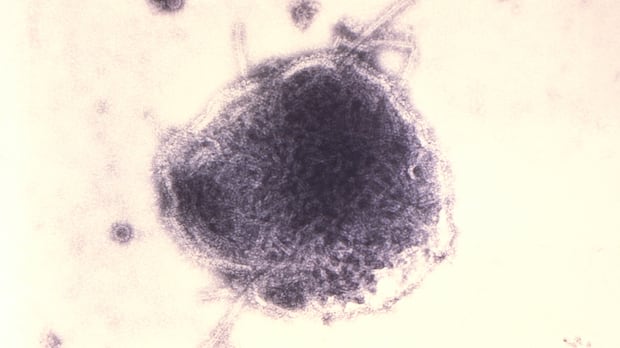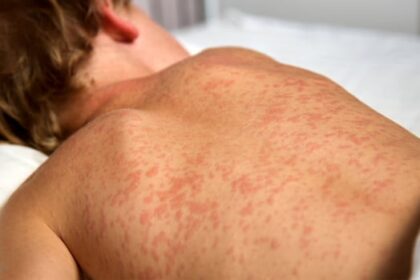ManitobaThe vast majority of reported measles cases in Manitoba since February have involved patients who didn’t have a single vaccine dose, according to provincial data.15 cases have required hospitalization so far this yearListen to this articleEstimated 5 minutesOut of the 245 probable and confirmed measles cases in Manitoba as of Oct. 11, 2025, more than 200 involved people who were not vaccinated, according to provincial data. (Phichet Chaiyabin/Shutterstock)Nearly nine in every 10 reported measles cases in Manitoba since February involved patients who didn’t have a single vaccine dose, according to the province’s data.There have been 230 confirmed and 15 probable measles cases of measles so far this year, according to the latest Manitoba Health data, which covers the period up to Oct. 11.Of those 245 cases, 214 — or 87.3 per cent — involved people who were not vaccinated for measles.While the vast majority of Manitoba’s population is protected against measles, the number of cases has continued to grow in the province because there still aren’t enough people who are immune, said Dr. Davinder Singh, a medical officer of health with the provincial immunization program. “The information demonstrates what we’ve been saying: the virus spreads because of not getting immunized,” Singh said. “It is spread through people that have not been protected.”Singh repeated the public health message that vaccination is the only way to protect people from contracting measles. Since mid-May, 1,513 infants between six and 12 months have received a measles vaccine, the province says. (Jan Sonnenmair/Getty)Eight of Manitoba’s cases involved people who had one dose of a measles vaccine and 12 others had two or more. Vaccination status was unknown in 11 cases, the province said. Singh said that’s within the realm of effectiveness for the measles vaccines. Those who get one dose have 93 per cent protection against the disease, while those who get two shots have 97 per cent protection, he said.A play-by-play of how measles outbreaks can spiral out of controlA two-dose vaccine program for measles, mumps, rubella and varicella (chickenpox) is routinely provided for kids at least one year old and again at age four to six in Manitoba.Manitoba expanded eligibility for vaccines to infants as young as six months old living in the Southern Health region and the Interlake-Eastern Regional Health Authority area in May.Since then, 1,513 infants between six and 12 months have received a measles vaccine, a spokesperson for the province told CBC. 15 cases required hospitalizationThere is no cure for measles. Treatment focuses on relieving symptoms for the disease, which most people recover from within two to three weeks, the province said. But the infection might lead to complications — common in infants and those with a weak immune system — including pneumonia and brain inflammation, which in extreme cases can become deadly. During pregnancy, measles can increase the risk of serious complications, including miscarriage and premature birth. In Manitoba, 15 cases have led to hospitalization this year, including two that led to intensive care unit admission, according to most recent public health data. No deaths linked to the disease have been reported in the province this year, but measles has claimed the lives of two premature babies in the country —one in southwestern Ontario and one in Alberta. Canada has seen an alarming increase in the number of cases in 2025. The country achieved measles elimination status in 1998, but imported cases have resulted in outbreaks of the highly contagious disease that started in New Brunswick in October last year. From Dec. 29, 2024, to Oct. 11, 2025, there had been 5,090 reported measles cases in Canada, 4,729 of them confirmed, data from Health Canada said. It is too early to say if cases in Manitoba are dropping off. On a week-by-week basis, cases have plateaued, with slight variations.But it’s likely not everyone who has had measles has reported it, said Singh.The province has learned anecdotally and through contact tracing that a significant number of people have had measles but chose not to get tested.If the virus gets into a community that hasn’t had measles circulating and has a low immunization rate, that can set another round of infections, Singh said.”All outbreaks do eventually come to an end, but in this case, things would end a lot quicker and with less kids having to go to the ER or get hospitalized or go to the ICU if people chose to immunize against measles,” he said. The Southern Health and the Interlake-Eastern health regions have low immunization rates, said Singh. That’s also where most measles infections have been detected.A two-dose measles vaccine program for measles, mumps, rubella and varicella (chickenpox) is routinely provided for kids at least one year old and again at age four to six in Manitoba. (Mike Heenan/CBC)Michelle Driedger, a professor in the department of community health sciences at the University of Manitoba, said there are a number of reasons that people may not get immunized. With the growth of anti-vaccination rhetoric, it becomes more challenging to ensure people aren’t caught in misinformation, she said. But there are also hurdles to accessing the vaccine for people in rural areas — for example, “if you’ve got a large family, but only some kids are eligible for the vaccines at that point in time, but you still have to bring all of your kids” to the vaccination site, she said.”So how can we deliver some of these programs maybe differently? That might be part of the solution.”One solution is to partner at the local level with leaders who are trusted in smaller communities to help public health design programs that tailor to those needs, said Driedger.Information sessions that include people with doubts on vaccines are also important, she said. ABOUT THE AUTHORSantiago Arias Orozco is a journalist with CBC Manitoba currently based in Winnipeg. He previously worked for CBC Toronto and the Toronto Star. You can reach him at santiago.arias.orozco@cbc.ca.
Wednesday, 4 Feb 2026
Canada – The Illusion
Search
Have an existing account?
Sign In
© 2022 Foxiz News Network. Ruby Design Company. All Rights Reserved.
You May also Like
- More News:
- history
- Standing Bear Network
- John Gonzalez
- ᐊᔭᐦᑊ ayahp — It happened
- Creation
- Beneath the Water
- Olympic gold medal
- Jim Thorpe
- type O blood
- the bringer of life
- Raven
- Wás’agi
- NoiseCat
- 'Sugarcane'
- The rivers still sing
- ᑲᓂᐸᐏᐟ ᒪᐢᑿ
- ᐅᑳᐤ okâw — We remember
- ᐊᓂᓈᐯᐃᐧᐣ aninâpêwin — Truth
- This is what it means to be human.
- Nokoma











